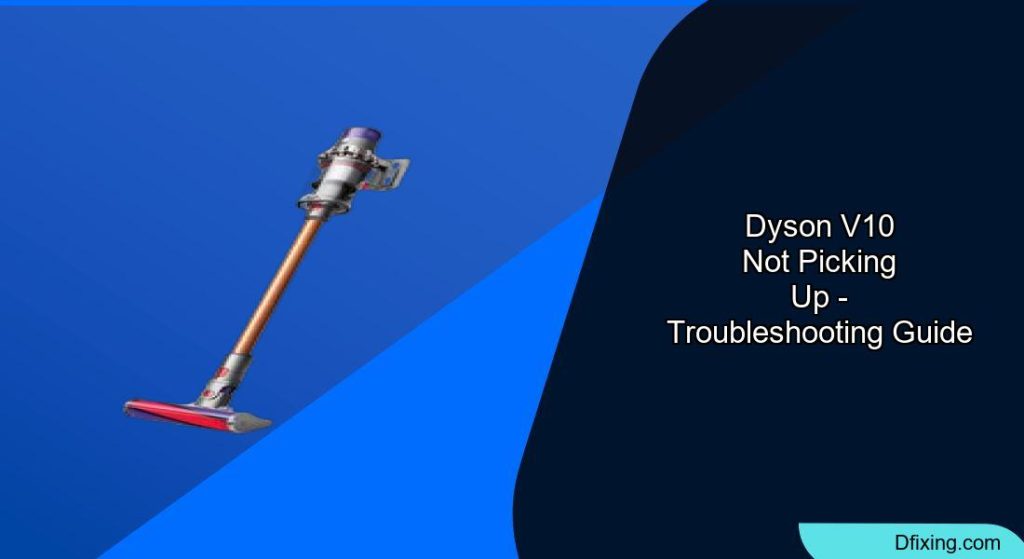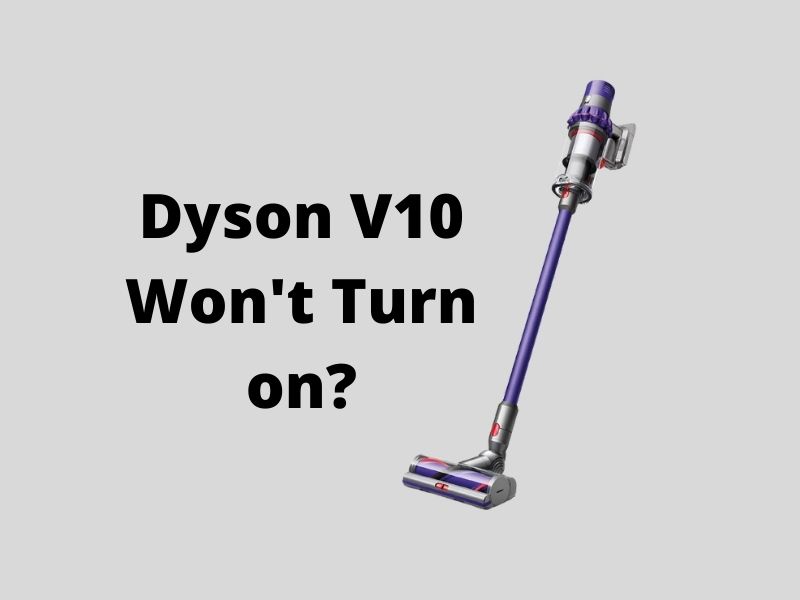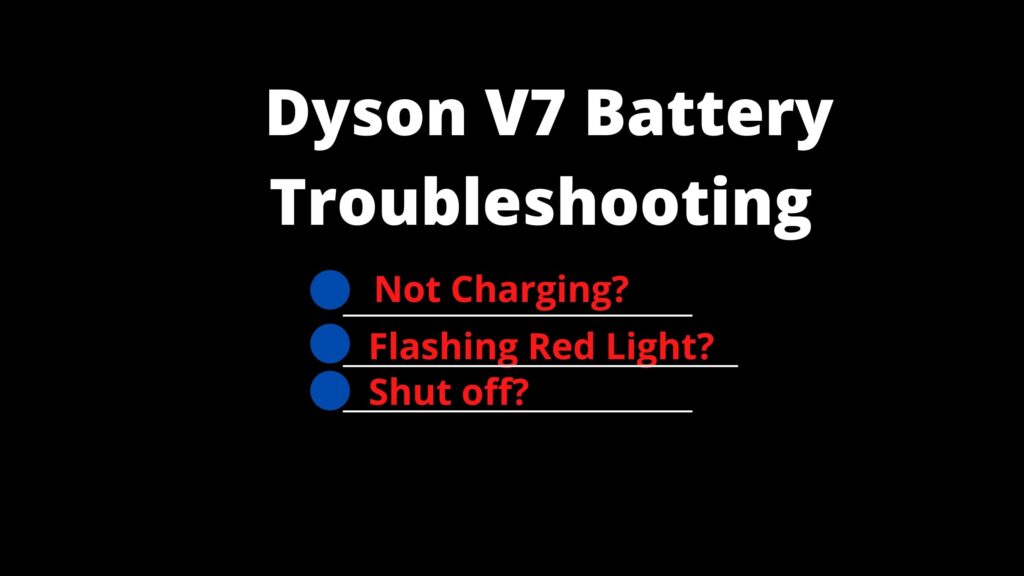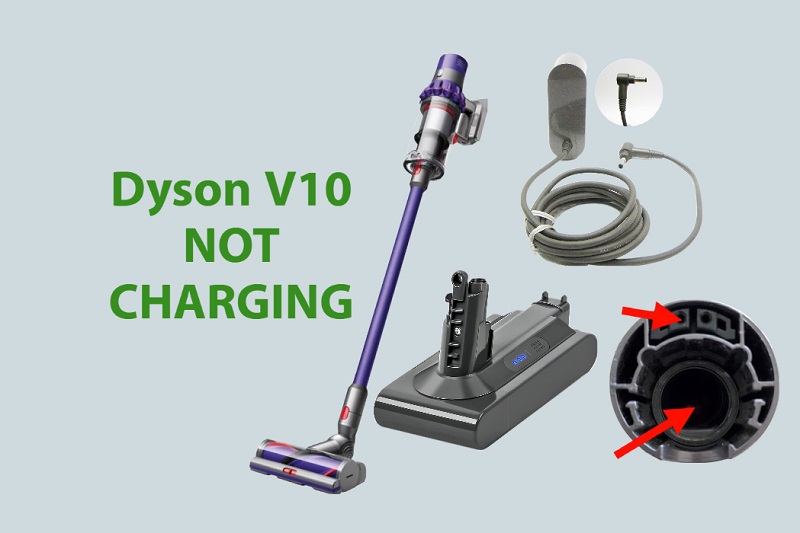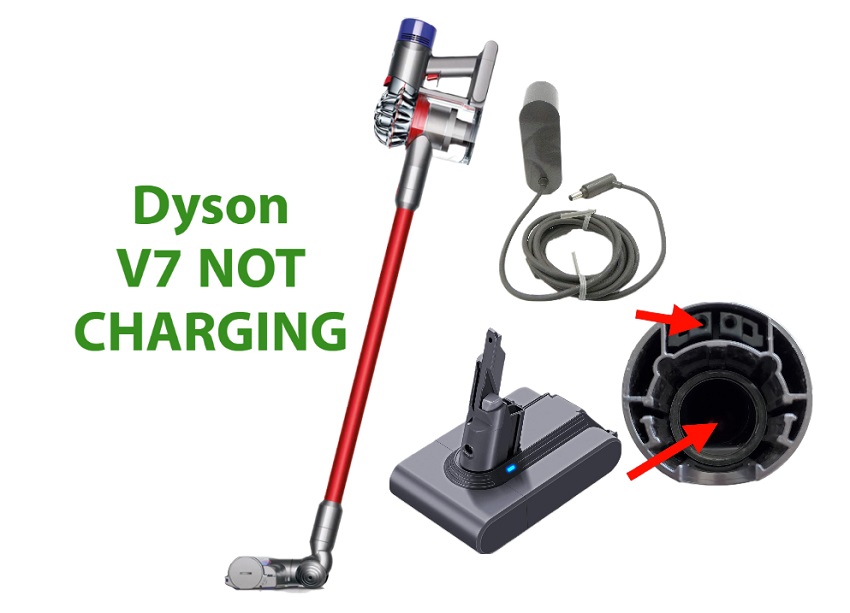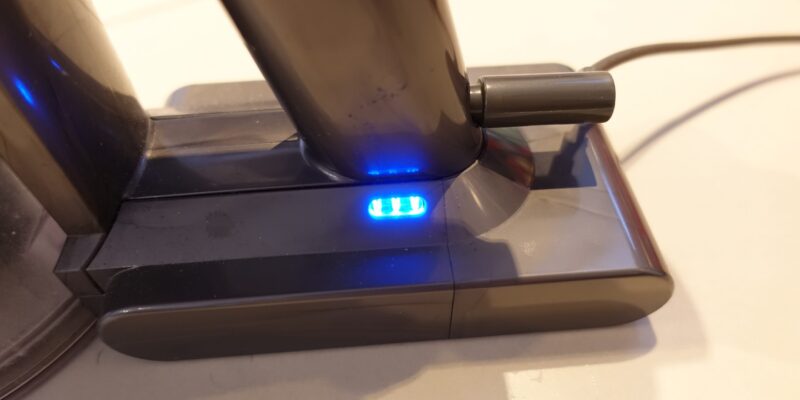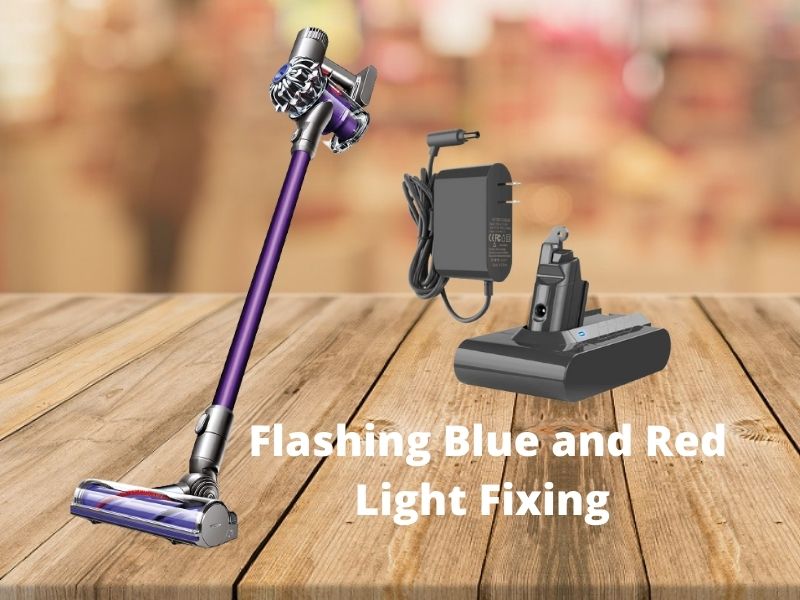The Dyson V10 is a powerful cordless vacuum cleaner known for its strong suction capability. However, like any vacuum, it can experience suction problems over time. If your Dyson V10 isn’t picking up debris as effectively as it once did, there’s likely a simple explanation and solution.
Affiliate disclosure: As an Amazon associate, We'll earn a commission for every successful order through our affiliate links in the article. However, you won’t be charged anything for this.
This comprehensive guide will walk you through the common causes of suction loss in your Dyson V10 and provide detailed, step-by-step instructions to diagnose and fix these issues. Whether you’re dealing with clogged filters, a full dust bin, or more complex problems, you’ll find practical solutions to restore your vacuum’s performance without necessarily requiring professional help.
Common Causes of Dyson V10 Suction Problems
When your Dyson V10 starts losing suction power, several potential culprits could be responsible. Identifying the cause is the first step toward an effective solution:
Clogged Filters
The Dyson V10 has a filtration system designed to trap fine dust particles. Over time, these filters accumulate debris and become clogged, restricting airflow and reducing suction power. The V10 model features a HEPA filter with ultra-tiny pores (0.3 microns) specifically designed to trap microscopic particles. When these tiny pores get blocked with dust or moisture, suction performance drops significantly.
Full or Obstructed Dust Bin
A dust bin filled beyond the “MAX” line restricts airflow through the vacuum. Additionally, debris can become lodged in the bin’s corners and crevices, further impeding performance even when the bin doesn’t appear completely full.
Brush Bar Issues
The rotating brush bar in the cleaner head can become entangled with hair, threads, and fibers. When this happens, the brush can’t rotate properly, reducing the vacuum’s ability to agitate and collect debris from carpets and floors.
Blockages in the Air Pathway
Obstructions can occur anywhere along the air pathway – in the wand, cleaner head, or cyclone intake. These blockages prevent proper airflow and diminish suction power.
Worn Components
Over time, parts like brush bars, belts, and seals wear out. Worn brush bristles can’t effectively agitate carpet fibers, while damaged seals allow air to escape, reducing suction power.
Diagnosing and Fixing Filter Problems
Filters are often the primary culprit behind suction loss. Here’s how to address filter issues:
Locating and Cleaning the HEPA Filter
Power off your vacuum completely before beginning any maintenance.
Remove the filter:
Locate the HEPA filter at the back of the machine. Press the release button and gently pull it out.
Inspect for debris:
Examine the filter for visible dirt accumulation. A heavily soiled filter will appear discolored.
Clean the filter properly:
- Run cold water through the filter (never use hot water, soap, or detergents)
- Gently tap the filter against your sink to dislodge stubborn particles
- Continue rinsing until the water runs clear
- Squeeze the filter gently to remove excess water
Allow thorough drying: Place the filter in a well-ventilated area for at least 24 hours. Ensure it’s completely dry before reinstallation – a damp filter can damage your vacuum and promote mold growth.
Reinstall correctly: Insert the dry filter back into its housing and press until you hear a click, confirming proper placement.
Filter Replacement Considerations
If your filter remains discolored after cleaning or is damaged, it’s time for a replacement. Dyson recommends replacing filters approximately every 12 months, depending on usage. Always use genuine Dyson filters for optimal performance and to maintain your warranty.
If your Dyson V10 filter is discolored, damaged, or needs replacing based on the manufacturer’s recommendation, consider the following option.

Official Dyson replacement with genuine quality and washable design.

Cost-effective 2-pack with high efficiency and cleaning brush.

3-pack with upgraded materials for enhanced performance.
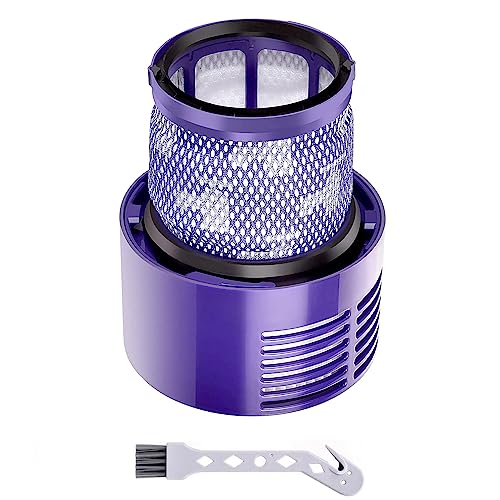
Affordable single filter with cleaning brush for basic needs.
Emptying and Cleaning the Dust Bin

A full or dirty dust bin significantly impacts suction power. Follow these steps for proper maintenance:
-
Position the vacuum over a trash bin.
-
Press the red release button to open the bin’s bottom door.
-
Empty contents completely: Tap the side of the bin gently to dislodge any clinging debris.
-
Inspect for residue: Check for dust or debris stuck to the bin walls or in corners.
-
Deep clean when necessary:
- Press the bin release catch to separate the bin from the cyclone unit
- Rinse the bin with cold water only (no soap)
- Wipe the cyclone’s exterior with a dry cloth or soft brush
-
Ensure the bin is completely dry before reattaching
-
Reattach securely: Align the bin with the main unit and press until you hear a click.
If the dust bin is cracked, broken, or not sealing properly, it may need replacing.

Official Dyson replacement for V10 large bin models
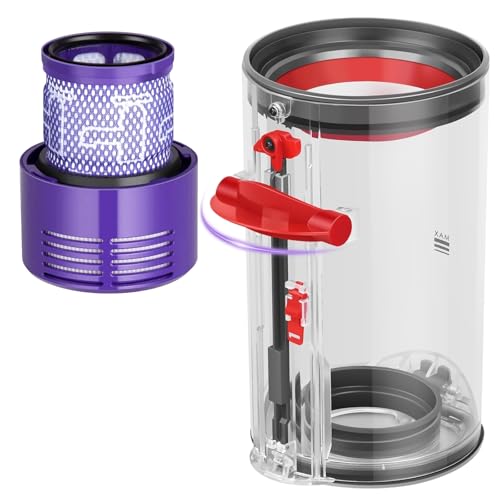
Enhanced design with improved sealing and dust control
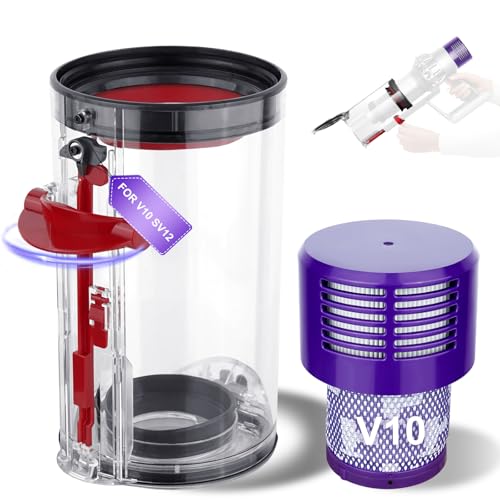
Includes HEPA filter for allergen capture and air quality
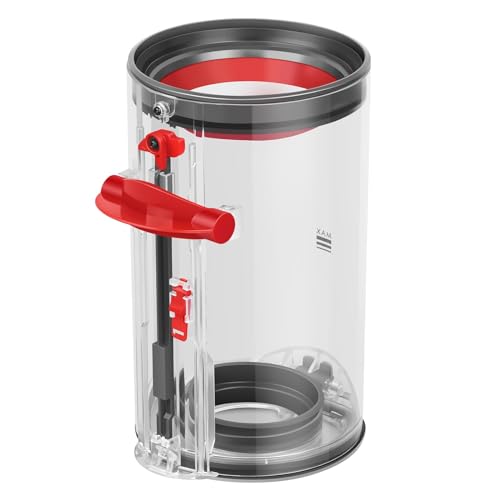
Cost-effective solution with high sealing performance
Clearing and Maintaining the Brush Bar
Hair and fiber entanglement around the brush bar is a common issue, especially in homes with pets or people with long hair. Here’s how to address it:
Remove the cleaner head from the wand by pressing the release button.
Flip the cleaner head upside down to access the brush bar.
Remove the brush bar:
- Use a coin to turn the end cap counterclockwise
Slide the brush bar out of its housing
Clear entanglements:
- Use scissors to cut away hair and fibers wrapped around the bar
- Pull debris free by hand
- Be careful not to damage the bristles during cleaning
Clean the brush housing with a cloth or small brush to remove any debris.
Inspect the brush bar ends for hair wrapped around the bearings.
Reassemble properly:
- Slide the brush bar back into the housing
- Replace the end cap and turn clockwise until it clicks
- Test that the brush rotates freely
Replacing a Worn Brush Bar
If the brush bristles are significantly worn down or damaged, replacement is necessary:
- Purchase a genuine Dyson replacement brush bar specific to the V10 model.
- Follow the removal steps above.
- Install the new brush bar according to the manufacturer’s instructions.
- Properly dispose of the old brush bar.
If the brush bar bristles are worn, damaged, or not effectively cleaning, consider replacing it.
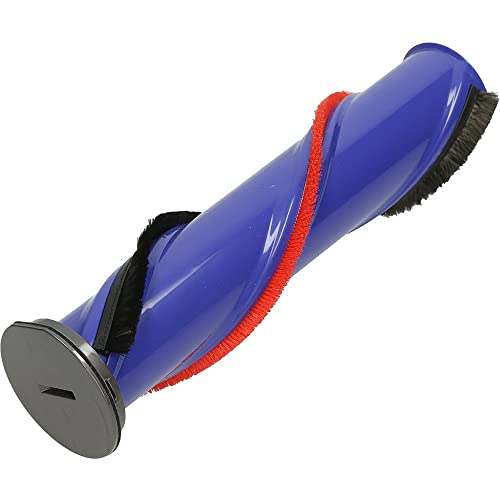
Official replacement for V8/V10 with durable nylon bristles
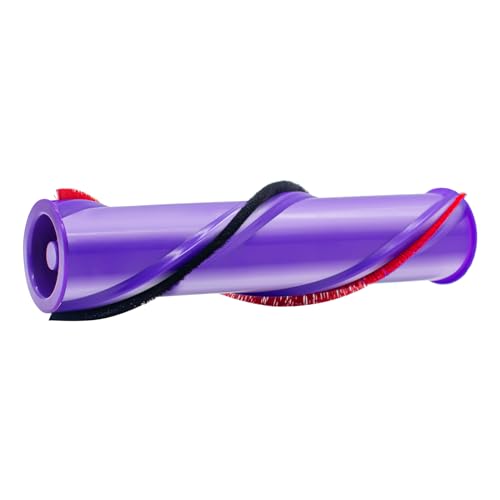
Cost-effective replacement with easy installation

Premium anti-tangle solution for pet hair removal
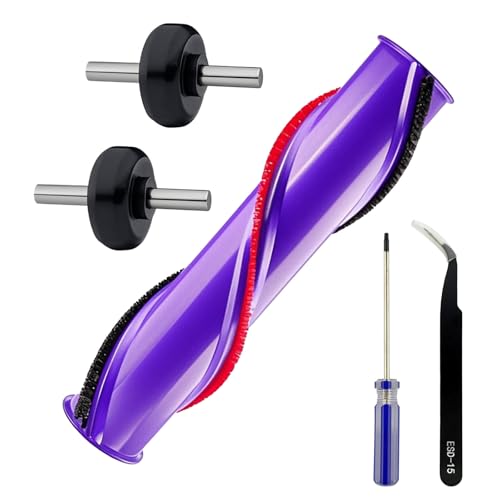
Complete replacement kit for worn components
Clearing Blockages in the Air Pathway
Blockages can occur throughout the vacuum’s air pathway. Here’s how to check and clear each section:
Checking the Wand
Disconnect the wand from both the cleaner head and the main unit.
Look through the wand to check for visible blockages.
Clear obstructions:
Use a broomstick or similar long object to push blockages through
For stubborn clogs, carefully use a wire coat hanger straightened with a hook at the end
Never use water to clear the wand
If the wand is cracked, damaged, or has a blockage that cannot be removed, it may need to be replaced.

Official replacement with quick-release design for V7-V11 models
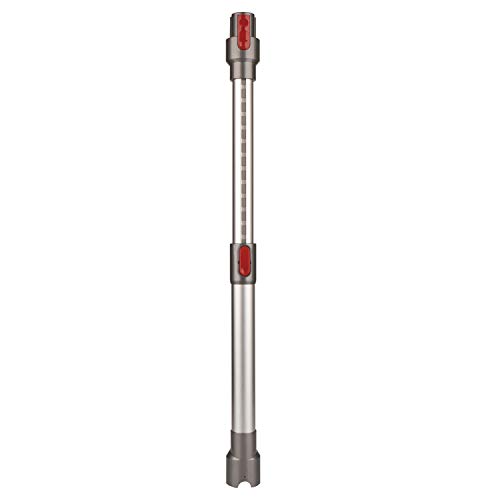
Adjustable length wand for maximum cleaning reach
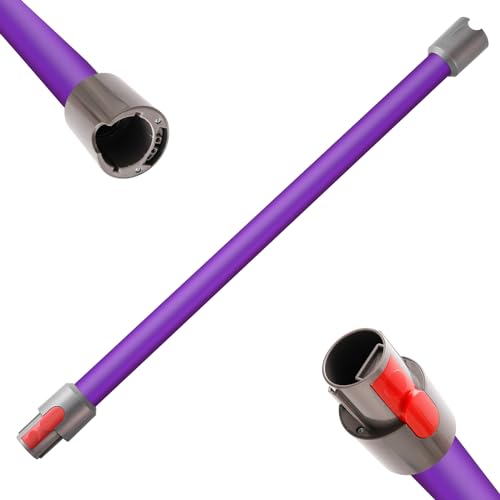
Durable aluminum alloy construction for V7-V15 models
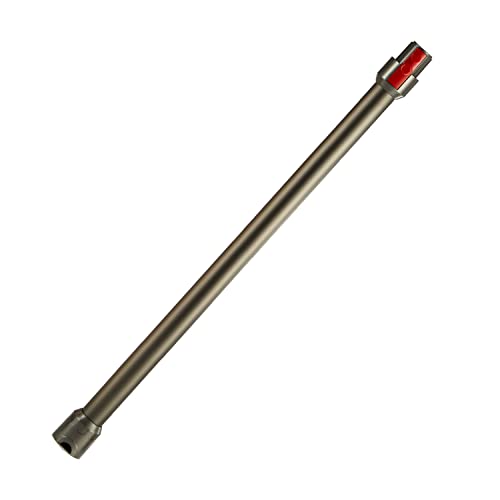
Budget-friendly non-genuine option with quick assembly
Inspecting the Cleaner Head
Disconnect the cleaner head from the wand.
Check the neck of the cleaner head where it connects to the wand – this narrow passage often collects debris.
Examine the underside for blockages around the brush bar entrance.
Clear any obstructions using long-nosed pliers or a similar tool.
Examining the Cyclone Intake
Remove the dust bin as described earlier.
Inspect the cyclone intake located where the dust enters the bin.
Clear the shroud (the part containing tiny holes) using a soft brush or cloth.
Check for blockages in the air inlet port on the cyclone’s side.
Use precision tools like tweezers to remove any visible debris.
Addressing Motor and Battery Issues
While less common than the problems above, motor and battery issues can also affect suction power:
Battery Performance Checks
Ensure proper charging: Verify the battery is fully charged before use.
Test different power settings: If the vacuum works on low but not high settings, this could indicate battery degradation
Perform battery calibration:
- Run the vacuum until it completely stops
- Charge it fully without interruption
- Repeat this process 3-4 times to recalibrate the battery
If the battery is not holding charge, draining quickly, or the vacuum is not powering on, it may be time to replace the battery.
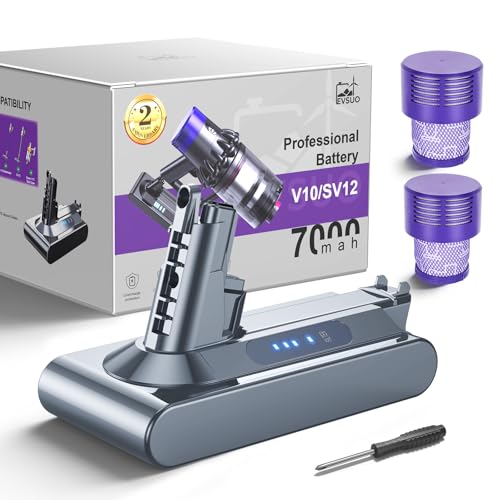
Highest capacity with 2-year warranty and advanced safety features
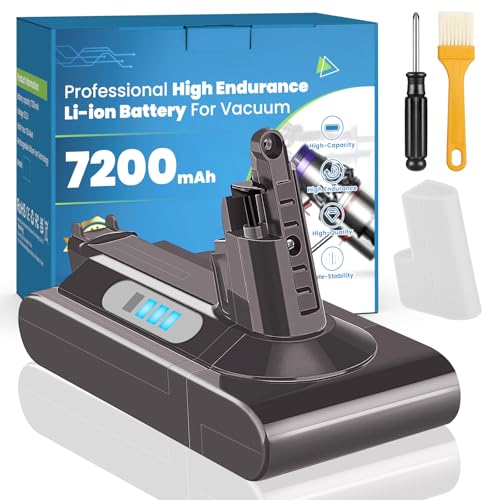
Max capacity with CE/FCC certified safety and quick installation

Balanced performance with industry-leading 3-year warranty
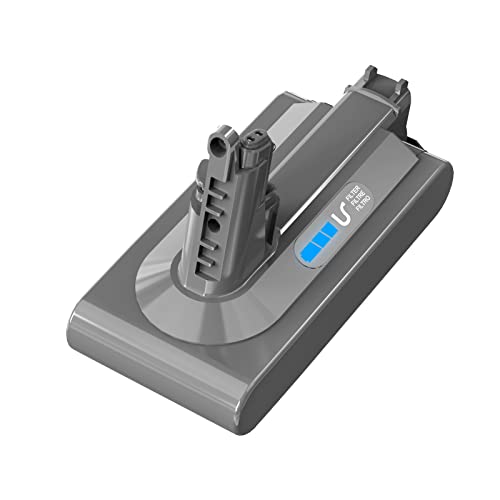
Budget-friendly option with essential safety protections
Motor Troubleshooting
Listen for unusual noises which might indicate motor problems.
Check for overheating: If the vacuum shuts off after brief use, it may be overheating due to blockages.
Verify normal operation: The Dyson V10 normally exhibits pulsing behavior on “max” setting when airflow is manually obstructed – this is a protective feature, not a malfunction.
Troubleshooting Specific Suction Issues
Intermittent Suction Problems
If your Dyson V10 suction fluctuates:
Check for warning lights on the display.
Test without the filter to determine if it’s the source of the problem.
Inspect the cyclone system for partial blockages that might cause inconsistent performance.
Vacuum Cutting Out on Higher Settings
If your vacuum works on low but cuts out on medium or high:
Test by partially blocking the suction hole to see if this triggers the cutout.
Clean the cyclone and air inlet thoroughly.
Consider pressure sensor issues – the vacuum may be detecting false blockages.
Motorized Brush Head Failures
If the brush head works intermittently:
Clean the electrical contacts on both the brush head and the vacuum handle using WD-40 to remove dust buildup.
Check for degraded motor brushes within the head itself.
Remember the safety feature: The Dyson’s power system halts if current exceeds 5A to prevent damage.
If the motorized brush head is damaged or not working, consider the following option.

Official replacement for V10 with powerful suction

Affordable third-party with hair-clearing technology

Budget option with enhanced maneuverability

Mid-range replacement with strong suction
Advanced Diagnostic Techniques
For persistent suction issues, try these advanced techniques:
Testing Without Components
Remove the filter and run the vacuum briefly to see if suction improves.
Test with different attachments to isolate where the problem might be occurring.
Using Compressed Air
Use a can of compressed air to blow out the cyclone chambers.
Direct short bursts of air through the filter and other components to dislodge hidden debris.
Complete Disassembly (For Advanced Users)
Consider disassembling the vacuum for thorough cleaning.
Clean all components individually, paying special attention to the cyclone assembly.
Reassemble carefully following the correct sequence.
Frequently Asked Questions (FAQ)
Why does my Dyson V10 have good suction through the hose but not the cleaner head?
This typically indicates a blockage or issue with the cleaner head itself. Check for obstructions in the neck of the cleaner head and ensure the brush bar rotates freely. Also inspect the connection points between the cleaner head and wand for debris that might be restricting airflow.
How often should I clean the filters on my Dyson V10?
Dyson recommends washing the filter at least once a month. However, if you have pets or vacuum frequently, you may need to clean it more often. A good rule of thumb is to check the filter every two weeks and clean when visibly dirty.
Why does my Dyson V10 keep pulsing on max power?
This pulsing behavior is actually a normal feature designed to protect the motor from overheating when airflow is restricted. If it occurs frequently during normal use, check for blockages in the air pathway or a clogged filter that might be causing airflow restrictions.
Can I wash the cyclone unit of my Dyson V10?
While you can wash the clear dust bin after separating it from the cyclone, Dyson does not recommend washing the cyclone unit itself with water. Instead, use a dry cloth or soft brush to clean the exterior of the cyclone. For stubborn debris inside the cyclone, use compressed air.
Why is my Dyson V10 not holding a charge?
Battery performance can degrade over time. If your vacuum isn’t holding a charge, try recalibrating the battery by fully depleting it and then charging it completely without interruption. Repeat this process 3-4 times. If problems persist, the battery may need replacement.
Conclusion
Most Dyson V10 suction problems can be resolved through proper maintenance and cleaning. Regular attention to filters, emptying the dust bin, and keeping the brush bar free from entanglements will help maintain optimal performance. For persistent issues, methodically working through the troubleshooting steps outlined in this guide should restore your vacuum’s suction power.
Remember that prevention is the best approach – implement a regular maintenance schedule to keep your Dyson V10 operating at peak performance. By addressing small issues before they become major problems, you’ll extend the life of your vacuum and ensure it continues to provide the powerful suction it was designed to deliver.

